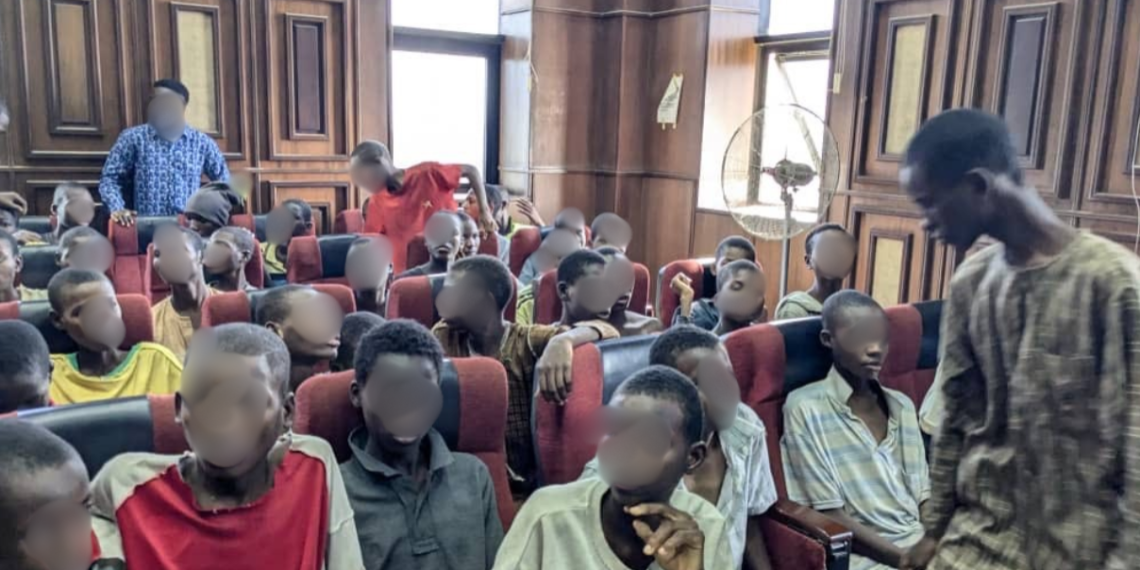Following their recent release, minors aged 14 to 17, arrested during August’s #EndBadGovernance protests and granted bail by President Bola Tinubu, have shared grim details of their time in custody.
The minors were among 76 individuals arraigned by police on severe charges, including treason and incitement, sparking national outrage when some collapsed from malnourishment during court proceedings.
President Tinubu intervened, ordering their release and an inquiry into the handling of their arrest and detention.
The released minors, now receiving medical attention, recounted prolonged hunger, poor conditions, and being housed with adult criminals.
In response, officials refuted the accusations, maintaining that the detainees were treated appropriately.
Minors detained during August’s #EndBadGovernance protests have spoken out following their release, shedding light on the harsh conditions they endured while in custody.
President Bola Tinubu’s decision to grant bail to 32 minors, part of 76 suspects arrested and charged with treason and incitement, came after widespread public outrage over their treatment, which culminated in several collapsing during court proceedings.
READ ALSO: IGP summons senior officers for investigation over detained minors
During the hearing at the Federal High Court in Abuja, visibly malnourished minors fainted, prompting outcry from civil society groups and human rights advocates.
In response, Minister of Information and National Orientation, Mohammed Idris, announced President Tinubu’s directive for their immediate release, citing humanitarian grounds and a commitment to investigating the actions of law enforcement officials involved.
As the minors were handed over to the governors of Kano and Kaduna states, they shared their traumatic experiences. Umar Ali, 15, described being held in near darkness and going without food for days at a time.
“We saw hell; we suffered a lot. We sometimes stayed for three days without food, and even when we were given food, it was not enough,” Ali said. He also recalled how prolonged confinement in darkness affected their vision during court appearances.
Ibrahim Aliyu Musa, another minor transferred from Kano to Abuja, recounted being housed with hardened criminals and enduring substandard food. “They served us beans in the morning, rice at lunchtime, and Gabza for dinner. It was inadequate and tasteless,” Musa explained.
A 13-year-old from Gwale Local Government Area shared that he was falsely accused of flying a Russian flag and detained at a notorious police facility. “We were kept with hardened criminals,” he noted.
Meanwhile, Hassan Mohammed, an Economics graduate, detailed his 90-day detention at Kuje Prison, highlighting inadequate food and dire conditions. He said, “They gave us small portions of garri and beans. It was a bad experience.”
In contrast, police spokesman Muyiwa Adejobi denied allegations of mistreatment, stating that the minors were not housed with criminals and calling reports to the contrary misleading.
Governors Abba Kabir Yusuf of Kano and Uba Sani of Kaduna have promised rehabilitation and support. In Kaduna, released minors were each given financial assistance and smartphones, with assurances of further empowerment programs if they demonstrated responsible behavior.
Secretary to the Kaduna State Government, Dr. Abdulkadir Muazu Meyere, emphasized that authorities would track the progress of the minors to ensure their reintegration into society.

 Latest3 days ago
Latest3 days ago
 Trends4 days ago
Trends4 days ago
 Education1 week ago
Education1 week ago
 Business6 days ago
Business6 days ago
 Football6 days ago
Football6 days ago
 Featured6 days ago
Featured6 days ago
 Health5 days ago
Health5 days ago
 Featured1 week ago
Featured1 week ago

